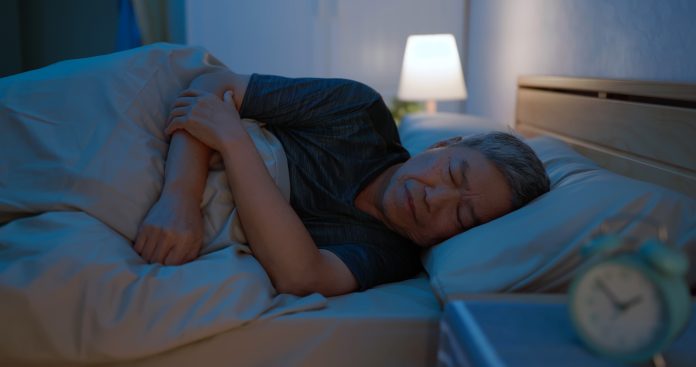People who experience sleep disorders are at greater risk of developing dementia and other neurodegenerative conditions later in life
New research provides insight into the relationship between sleep and neurodegenerative diseases and whether disrupted sleep is an early sign of neurodegeneration or an increased likelihood of developing dementia at a later stage.
Scientists at the UK DRI at Cardiff and the U.S. National Institutes of Health (NIH) Intramural Center for Alzheimer’s and Related Dementias analysed data from over one million electronic health records to examine the relationship between sleep and neurodegenerative disease.
The analysis is published in the journal npj Dementia.
The researchers analysed over 1 million people’s health records
Data from three biobanks —Secure Anonymised Information Linkage (SAIL) databank, UK Biobank, and FinnGen —were analysed. Across the biobanks, scientists obtained accurate, timestamped records of when individuals experienced sleep disorders, as documented in their medical records.
The team looked at people who had been diagnosed with one or more sleep disorders, which were grouped for data analysis into ‘organic’ sleep disorders thought to be caused by physiological factors, with typical examples being narcolepsy, sleep apnoea, circadian rhythm sleep disorders, hypersomnia, (excessive daytime sleepiness), parasomnias (abnormal behaviours or movement during sleep, e.g. sleepwalking, night terrors), cataplexy; and ‘non-organic’ sleep disorders not linked to a known physiological condition, including generalised insomnia and nightmares.
Joint first author Dr Emily Simmonds, Bioinformatician at the UK Dementia Research Institute at Cardiff University, said: “In our study, we wanted to understand the complicated relationship between sleep and dementia. People living with dementia often experience sleep problems, but there is not yet enough evidence to say for sure whether poor sleep increases the risk of dementia.
“We set out to see if we could figure out what order these things are happening. By using biobank data, we had timestamped records of when people had sleep disorders, and exactly when they were subsequently diagnosed with a neurodegenerative disease – rather than relying on self-reporting.”
Increased risk of dementia, Alzheimer’s, and Parkinson’s
The researchers employed large-scale statistical analysis methods to map the relationships between various neurodegenerative diseases and sleep disorders. They found that sleep apnoea, along with other organic and non-organic sleep disorders, was associated with an increased risk of developing dementia (general diagnosis) within 10 to 15 years following the initial sleep disorder diagnosis. This risk was notably higher among individuals with multiple recorded sleep disorders.
In the case of Alzheimer’s disease, organic sleep disorders were explicitly linked to an elevated risk of developing the condition within 10 to 15 years after the diagnosis of the sleep disorder.
For vascular dementia, the presence of sleep apnoea and other organic and non-organic sleep disorders was associated with an increased risk within 5 to 10 years following diagnosis. As with general dementia, individuals with multiple sleep disorders experienced an even greater risk.
Similarly, both organic and non-organic sleep disorders were linked to a higher risk of developing Parkinson’s disease within 10 to 15 years after diagnosis.
Although large-scale, the study is limited by its observational nature. It also did not account for the use of medication or other interventions to improve sleep or co-morbidities, which may have had an impact. The researchers are now aiming to factor the effect of interventions into further analysis to examine whether improving sleep leads to a reduction in risk.
Joint first author Kristin Levine, Data Scientist at the NIH’s Center for Alzheimer’s and Related Dementias, said: “One of the exciting things about identifying people at higher risk of developing a neurodegenerative disease 10-15 years before diagnosis is that it gives us time to implement treatments that may delay or prevent development of disease. In the case of sleep disorders, future studies could look at the effectiveness of treatment with a continuous positive airway pressure machine (CPAP) and/or sleep medications to see if those interventions can lower the associated risk of later developing a neurodegenerative disease.”
Joint first author Kristin Levine, Data Scientist at the NIH’s Center for Alzheimer’s and Related Dementias, said: “One of the exciting things about identifying people at higher risk of developing a neurodegenerative disease 10-15 years before diagnosis is that it gives us time to implement treatments that may delay or prevent development of disease. In the case of sleep disorders, future studies could look at the effectiveness of treatment with a continuous positive airway pressure machine (CPAP) and/or sleep medications to see if those interventions can lower the associated risk of later developing a neurodegenerative disease.”
Sleep expert Prof Derk-Jan Dijk, Group Leader at the UK Dementia Research Institute Centre for Care Research & Technology at Imperial College London and the University of Surrey, said: “This study adds to the growing body of evidence that sleep disorders, such as sleep apnoea, increase the risk for neurodegenerative disease. It is therefore important that we develop scalable technologies to diagnose and treat these sleep conditions early and effectively.”








